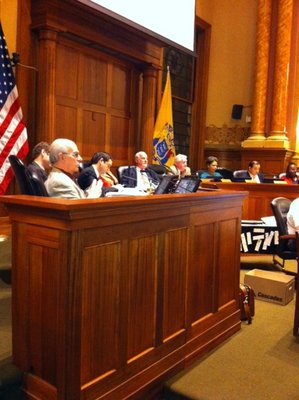There were no protests. There were no crowds. There was no shouting. And the only angry union members present didn’t work for the city. Wednesday’s City Council meeting hardly felt like a municipal budget public hearing.
In contrast to the long, drawn out 2011 municipal budget process, the 2012 budget season has, so far, attracted little fanfare or controversy.
The administration of Mayor Jerramiah T. Healy formally presented the city’s 2012 spending plan to the City Council in late February, and the council introduced it days later – the earliest the municipal budget has been introduced in years, according to longtime observers.
The $469.3 million city spending plan includes a tax rate of $34.78 for every $1,000 of property owned. That figure is up 28 cents over last year’s tax rate, which was $34.50 for every $1,000 of property owned, according to Assistant Business Administrator and Budget Director Robert Kakoleski.
This slight tax increase is for municipal taxes only. Property owners receive quarterly tax bills that combine city taxes, in addition to taxes paid to the Board of Education and Hudson County. Any tax increases approved for the local school district or for Hudson County are beyond the control of the mayor and council, but will be reflected in the combined quarterly tax bills received by property owners.
The $469.3 million city spending plan includes a tax rate of $34.78 for every $1,000 of property owned. That figure is up 28 cents over last year’s tax rate.
__________
The mayor said taxes in the proposed budget were held steady due to several factors. The city’s pension costs are down this year by $6 million because municipal workers are now required to contribute more money to their retirement plans. Salary costs are down $1 million compared to last year due to layoffs in 2011. Health care costs are also down. Budgets for most autonomous city agencies have not been increased in the proposed budget. And the city expects to receive the same level of aid from the state as it did in 2011.
Municipal spending will also be held down this year through an aggressive consolidation plan, Healy added.
“Last year we began the process of streamlining government and we continue with that difficult, but necessary, task this year,” said Healy. “Over the next several weeks my administration will unveil a consolidation plan that will streamline services and move offices and functions within and across departments. The first two elements of the consolidation plan are to combine the Department of Public Works and the Jersey City Incinerator Authority, and to create a Department of Public Safety, which is to be comprised of the Fire Department, Police Department, the Office of Emergency Management, the enforcement functions of the Parking Authority, and public safety telecommunications.”
For the past two years the city’s non-uniform employees have been required to take 12 furlough days. The 2012 budget does not include any furlough days for municipal workers, according to Business Administrator Jack Kelly.
At the March 28 City Council meeting Kelly also added that the budget may be further helped by pending grants that are not currently reflected in the spending plan. He did not, however, specify which grants are pending.
Residents comb through budget, have questions
Few residents spoke at the public hearing on the budget. Of those who did, two flagged specific line items that raised concerns.
“The danger I see in the budget is this, we have a lot of bonding debt in this budget,” said taxpayer advocate Yvonne Balcer. “Twenty years ago, we had something like $250 million in bond debt. Well, the bonding debt is now $492 million. So, you can’t really cut a lot if you have all this bonding debt.”
Later, Balcer raised concerns about the city’s shrinking ratable base, which impacts the amount of money coming in from taxpaying properties.
“They say there’s $31 million less in this year’s budget,” said resident Riaz Wahid. “That means as a taxpayer I should be paying about $700 less in my property taxes. But that’s not the case. Instead, I’m getting a tax increase of a quarter.”
He also noted the city is paying $1.5 million in unemployment insurance for workers who were laid off last year.
“Those were low-level people,” Wahid added. “We’re paying $1 million more in unemployment insurance. We could have kept some of those people and paid a little less in unemployment insurance. They didn’t get rid of any high-level people who were making the big salaries.”
Kakoleski said later the city is often barred from laying off high level civil service employees who have more seniority than low ranking city workers.
E-mail E. Assata Wright at awright@hudsonreporter.com.
